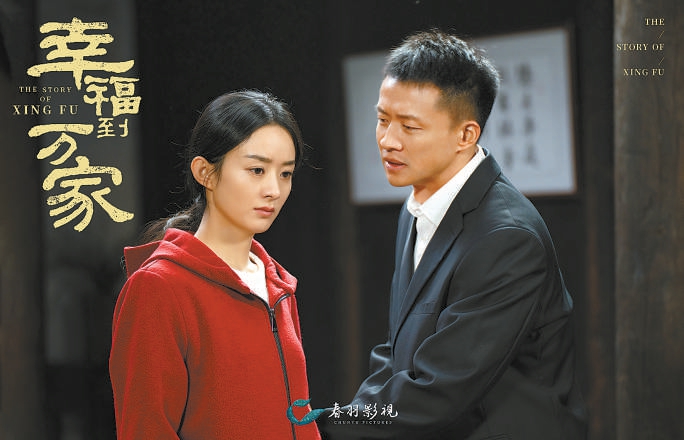The hit drama “Happiness to Ten Thousand Homes” interprets the contemporary rural theme Zheng Xiaolong: true reflection of rural changes
The reality TV series “Happiness to Ten Thousand Homes” starring Zhao Liying, Liu Wei and Tang Zeng and directed by Zheng Xiaolong and Liu Xuesong is being broadcast on Beijing Satellite TV and Dragon TV. The play is a rare rural work by director Zheng Xiaolong. In the face of a new type of challenge, Zheng Xiaolong believes that it is necessary to have a basic judgment and grasp of the real theme, “We hope to truly reflect the changes in the countryside through this play, neither Create confrontation without exaggerating conflict, showing a real countryside.”
Focus on “what to do when the countryside becomes rich”
“Happiness to Ten Thousand Family” tells the story of a rural girl He Xingfu (played by Zhao Liying) who has grown up after multiple tests of career, marriage, love and family. Inspirational stories of civilization, spiritual civilization, legal civilization, and ecological civilization. The show has remained popular since its inception, and has also performed well on two TVs, ranking first in the prime-time TV drama list for 7 consecutive days. As of July 6, the average viewership rate of the show’s Kuyun on Beijing Satellite TV reached 0.4944%, and the average viewership rate on Dragon TV’s Kuyun reached 0.4517%.
The main line of the series revolves around the inspirational growth of women. The story seems simple, but it is full of sharpness. It is full of concern and kindness to reality, not only describing the basic status quo of modern rural society and the real problems encountered by ordinary people, but also projecting the era’s appeal of the new women’s pursuit of happiness. In the opening plot, He Xingfu firmly defended the legitimate rights and interests of his sister in the marriage incident. According to the subsequent plot development, He Xingfu will challenge the village authority many times and become a challenger of the old village rules.
In Zheng Xiaolong’s opinion, he chose such a story because he found that most of the rural themes in the past two years have been about “the rural areas become rich from poor”, and the question of “what to do when you get rich” has not received enough attention. ‘s display. “The rural areas are not only changing from poor to rich, but also in the aspects of spiritual civilization construction and rule of law construction.” Zheng Xiaolong believes that the changes in the theme are also in line with the theme of “rural revitalization”, and can also be used in the content of realistic themes. Expansion presents some useful explorations.
Multi-dimensional display of new changes in rural areas
The story background of the characters in the play comes from the novel “The Legend of Qiu Ju”. Zheng Xiaolong revealed that the story was adapted by well-known screenwriter Zhao Dongling as early as five or six years ago. The previous version was more about the plot of Qiu Ju’s lawsuit.
In many revisions, the story has been greatly changed, and it is more integrated with reality and the actual situation in the current rural areas. “This play sharply talks about the contradiction between ‘old’ customs and ‘new’ ideas in some rural areas. We talk about the changes in rural and urban areas through He Xingfu’s personal choice.”
In Zheng Xiaolong’s view, this is also the practical significance of the drama, telling the theme of the gradual unification of urban and rural development. “It turned out that we thought that the city was developing first, but in fact, the countryside is also progressing. The gradual understanding between He Xingfu and Wanshantang is actually talking about the construction of the rule of law in the countryside and the popularization of the awareness of the rule of law. We are still in the play. He talked about the importance of green mountains and clear waters, about the environmental protection of rural areas, and the transition from a traditional human society to a modern society ruled by law. These contents are actually the construction of grassroots civilization in rural areas, from the changes of mountains, rivers and rivers to the spirit of the people. Changes in appearance, values, and awareness of the rule of law,” he said.
Zhao Liying interprets characters with true feelings
Choosing Zhao Liying to play the role of He Xingfu, Zheng Xiaolong revealed that it was decided a long time ago. He took a fancy to Zhao Liying’s stubbornness and temper, coupled with her rural life experience, and thought she was the most suitable actor, “She has that vigorous vitality in her, and we decided on her very early. But then Zhao Liying became pregnant and gave birth. The child has no schedule, but fortunately, the script is also changing, and when the script is finished, she also recovers.”
The cooperation with Zhao Liying is not the first time. Zheng Xiaolong revealed that in his TV series “Golden Wedding”, Zhao Liying once played the childhood role of the third daughter in the play. After working together again many years later, Zheng Xiaolong did not shy away from appreciating Zhao Liying, “During filming, Liying had digested and understood the plot thoroughly before she played the characters. She can’t make it through the dialogue. She is actually playing the character she understands with true feelings, and using the performance to transform the character’s experience into her own life experience.” (Reporter Li Xiazhi)
